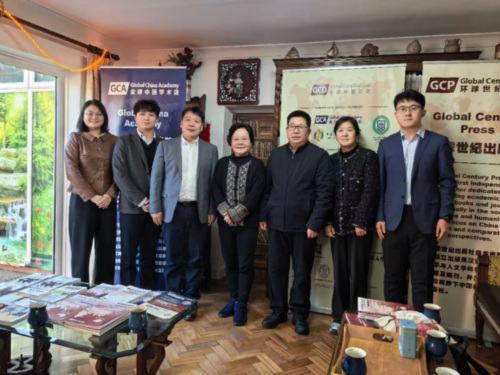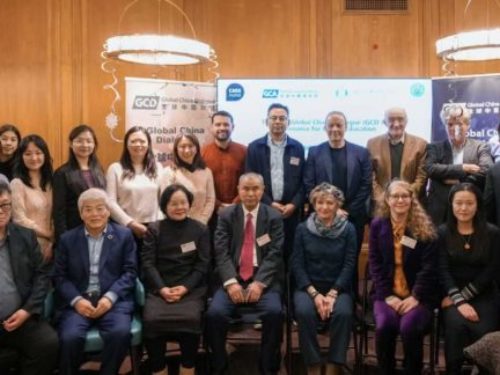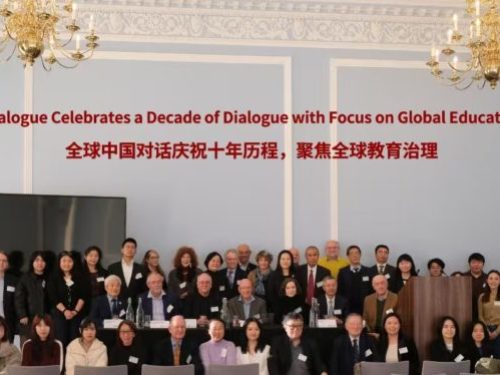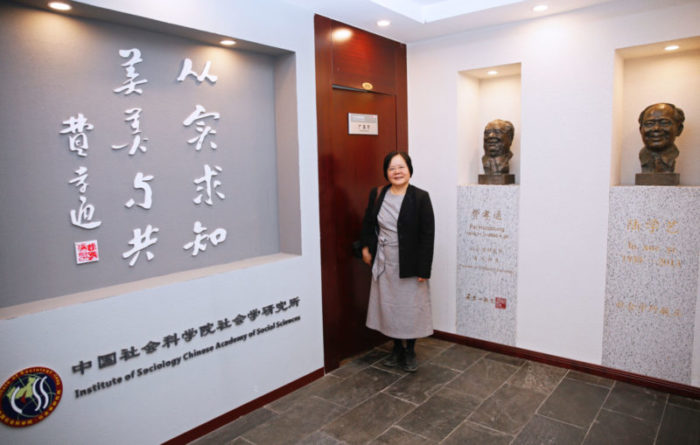
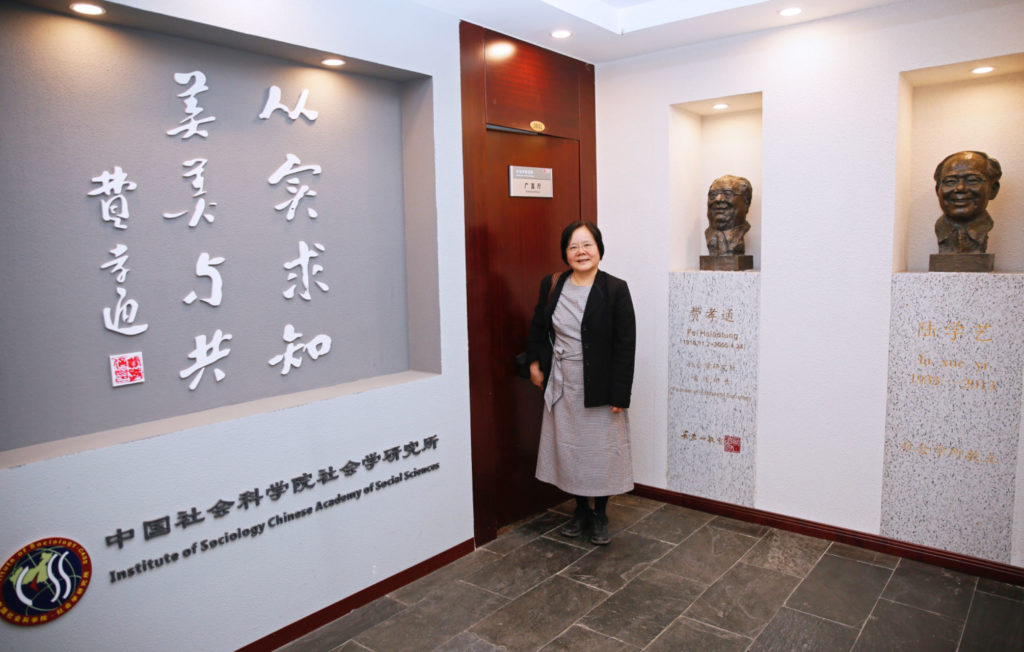
Introduction
On the occasion of being an invited speaker at the ‘International Conference: The Chinese Path to Modernization and the Pursuit of Humanity’s Common Values’ at Xiamen University from April 4-6, 2023, I visited China and conducted a series of lectures, seminars, and academic exchanges at various universities in Xiamen, Wuhan, Tianjin, and Beijing. In addition to fulfilling my academic responsibilities, I also participated in events and activities aligned with the social mission of the Global China Academy. This part includes only academic activities in Beijing from 18-20th April.
Timeline
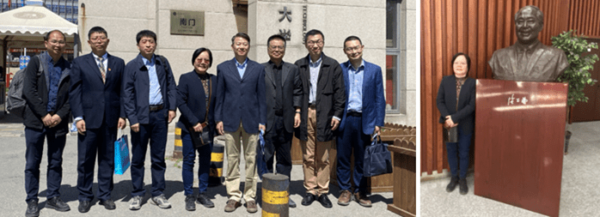
On the afternoon of April 18th, I visited the School of Humanities and Social Sciences at Beijing University of Technology (BUT). It was established by Professor LU Xueyi (1933-2013), the former Director of the Institute of Sociology at the Chinese Academy of Social Sciences (CASS) and former President of the Chinese Sociological Association. I paid tribute to Professor LU Xueyi’s statue (right photo), a reason that will be explained in the section on the CASS seminar. I also met Professor TANG Jun (one my left in the left photo), Dean of the School of Humanities and Social Sciences, and his colleagues. We knew each other since Professor Tang worked at CASS. Coincidentally, I also met Professor LI Xiaozhuang (on my right in the left photo), from the Institute of Sociology at the Beijing Academy of Social Sciences (BASS). He was Professor Lu’s PhD student. I met him in 2014 when he was working on sorting through Lu’s more than 1,000 diaries.
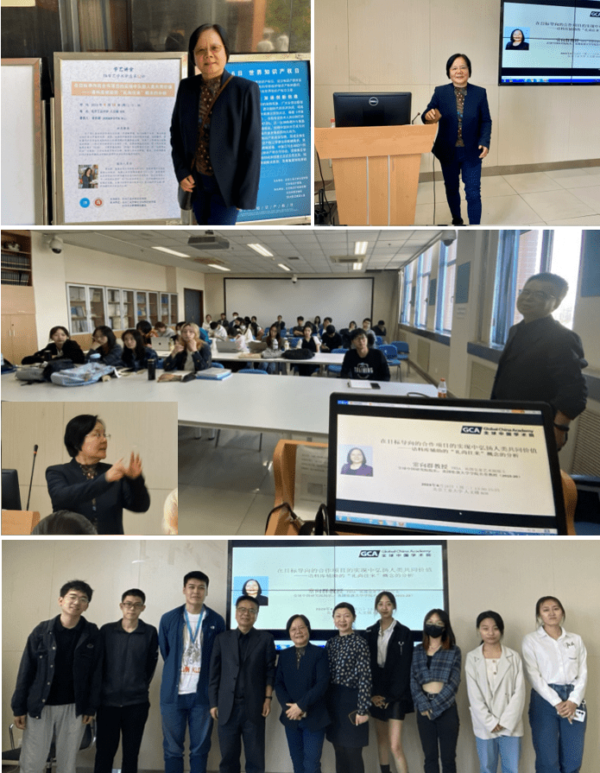
Professor LI Junfu (on my right in the bottom photo) chaired the lecture I delivered. He was a Visiting Fellow at the University of Oxford in 2019. He presented a paper titled ‘Society Building: Peacemaking with Chinese Characteristics’ at the 6th Global China Dialogue: Governance for World Peace, which I organized. The title of my lecture was ‘Realization of Goal-Oriented Cooperative Projects, Promoting the Common Value of Mankind: A Corpus-Assisted Analysis of ‘recipropriety’ (lishang-wanglai 互适). Dr CAO Feilian (on my left in the bottom photo), Associate Professor, joined the lecture. She acted as the interpreter for Professor LU Xueyi when he gave a seminar on society building at LSE in 2011, which I arranged when I worked there.
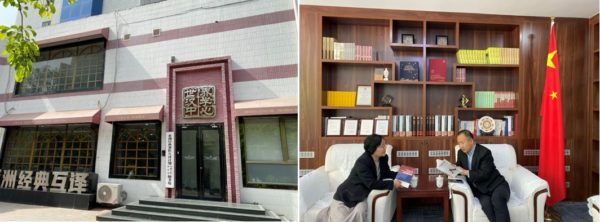
On the morning of Aprol 19th, I was invited by Professor XU Baofeng (right in left photo) for a meeting in his office at Beijing Language and Culture University (BLCU). He is Director of the Belt and Road Research Institute, Director of the World Sinology Center, Head of the Secretariat for the Asian Classics Inter-Translation Project, Leader of the National Project for the Chinese and Foreign Sinologists and Translators Talent Database and Chinese Culture Translation and Research Network. He was an invited speaker at the 6th Global China Dialogue: Governance for World Peace, where he delivered the paper ‘Can Confucian Ethics Help in the Elimination of Global Unilateralism, Extremism and Terrorism Based on a Comparison Between Countries and Regions with and without Influence from Confucius Ethics?’ in 2019. Professor Xu collaborated with the GCA in several ways. For instance, he published a paper titled ‘China’s Contribution to the Future of Governance’ by Professor Martin Albrow in the inaugural issue of the journal he founded, World Sinology Information (01), on April 28, 2020. He facilitated Professor Albrow’s participation and publication of the paper ‘The Prospects of the Belt and Road Initiative in the Post-pandemic Era: A Dialogue’ in the Guangming International Forum, which was published in the Guangming Daily on May 27, 2020. With his assistance, the Global Century Press published a book titled Witnessing China Combating COVID-19: My Story in China in both English and Chinese. Both Professor Albrow and I were invited speakers at the UN Chinese Language Day, discussing sinology and the Chinese language during the epidemic, and the Ceremony to Launch the International Cangjie Plan on April 19, 2020. In this meeting, we explored different possibilities of collaboration.
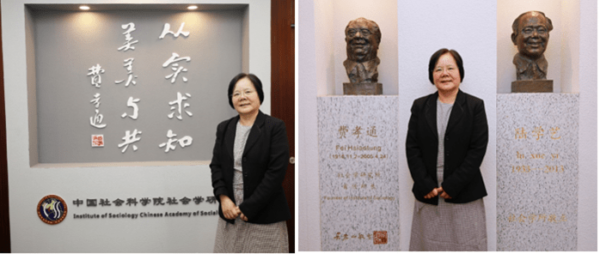
On the afternoon of April 19th, I was invited to give a lecture at the Institute of Sociology (CASS). I always feel at home there because my academic achievements are closely related to two great figures there: LU Xueyi (statue to my left in the right photo) and Fei Xiaotong (statue to my right in the right photo). I was introduced to LU Xueyi in 1987 by the successor of Fei Xiaotong, the then Director of the Institute of Sociology, Professor HE Jianzhang (1926-2004), when LU was serving as the Deputy Director there. It came at a time when the institute had just been granted the first major project on Marxist Sociology Theoretical Studies in China, funded by the National Social Science Foundation (NSSF) (1987-1991). Professor He offered me a position there before I graduated with my Master’s degree in 1987, as the application for the major project was likely to be successful. I was the only person in China who had received three years of training in Marxist sociology under Professor Ding Kequan at Northeast Normal University and was willing to work on this project. Professor Lu became the Director in 1988 and led the major project until 1991. As a team member, my book, On Marxist Sociology (1992) was a significant outcome of the project. I worked closely with Professor Lu and maintained a good relationship with him. After his passing, I wrote his obituary and published it in Network, the Magazine of the British Sociological Association, Winter 2013, p44.
Although my primary research focus was on Marxist sociology with CASS, I was a lecturer in Sociology at the People’s Public Security University of China (PPSUC). This role was a direct result of Fei Xiaotong’s efforts to promote sociology in public security universities in Nanjing and Beijing, starting in 1984. PPSUC recruited me right after I graduated in 1987, recognizing the unique position I held as a postgraduate from the only normal university in China offering an MA degree in sociology at the time. Coincidentally, shortly after becoming a Visiting Fellow at City University in 1991, I joined an ESRC-funded research project co-developed by Professor Stephan Feuchtwang and Professor SHEN Guanbao (1949-2016) when he was as a Visiting Fellow at LSE. Given that Shen was the only PhD student Fei Xiaotong supervised at CASS, Kaixiangong Village, Fei’s fieldwork site, naturally became a focal point in our project. My subsequent book, Guanxi or Li Shang Wanglai?: Reciprocity, Social Support Networks, Social Creativity in a Chinese Village (2010/2011 in both English and Chinese), was the result of extensive fieldwork in that village. Additionally, I served as a co-editor of FeiXiaotong Studies (3 volumes in both English and Chinese).
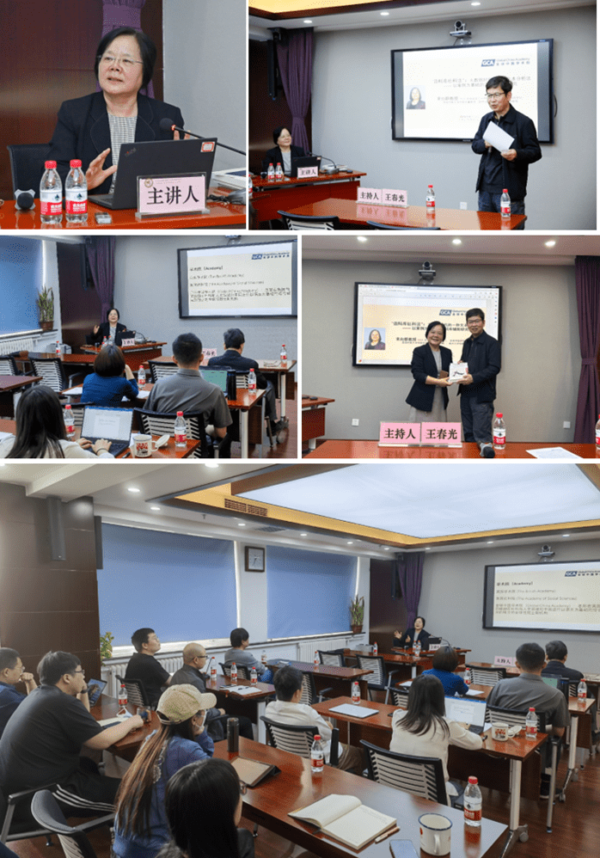
The title of my talk was ‘A Text Analysis Method in the Era of Big Data: Corpus-Assisted Research Based on Case Studies’. It was chaired by WANG Chunguang (pictured top right), Deputy Director of the Institute of Sociology at CASS and Deputy Secretary-General of the Chinese Sociological Association. The arrangement was facilitated by FU Xuejun, Director of the Research Office of the Institute of Sociology. Afterwards, we discussed the changes that have occurred over the past three decades at the Institute, as he is the only remaining individual from the time I worked there on the NSSF-funded major project who has yet to retire.
During my talk, I shared related corpora such as the collected works of Ding Kequan, a pioneer of Marxist sociology, Fei Xiaotong’s complete works, and Marx and Engels’ Complete Works. I learned that LU Xueyi’s complete works (10 volumes) have just been published to commemorate the 10th anniversary of Lu’s death. They would be a great addition to my collection of corpora. Dr YU Qin, an Assistant Research Fellow at the Anti-Corruption Research Office, informed me that she completed her PhD under the supervision of Professor SU Jinzhi at the Institute of Linguistics, CASS. Professor Su is the former President of the Chinese Social Linguistics Association. Dr Yu would like to collaborate with me to apply corpus approaches to her work. She also sent me some of her related published papers later.
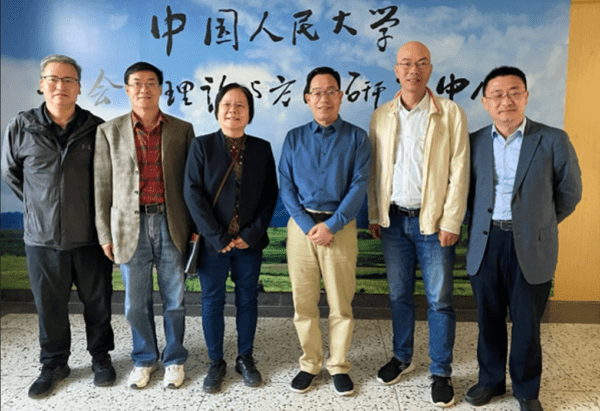
On the late afternoon and evening of April 19th, after I finished my talk at CASS, I attended a short meeting at the Ministry of Education’s Research base — Centre for Sociology Theory and Methodology at Renmin University of China. It was founded by Professor ZHENG Huangsheng (1936-2014), former Vice-President of Renmin University and former President of the Chinese Sociological Association. My first meeting with Professor Zheng was at a sociology conference in Shenyang in 1985. He had been my mentor for about three decades because we shared common interests. In 2014 he chaired a lecture for me and signed a certificate of Professional Research Fellow with no time limit at the Centre, a few months before his passing. Afterwards, I wrote ‘Zheng Huangsheng: Life and Work’ and published it in Network, the Magazine of the British Sociological Association, in Spring 2015.
The meeting was chaired by Professor FENG Shizheng (to my left in the top photo), Dean of the School of Sociology and Demography (and was promoted to Vice-President of Renmin University in October 2023), Professor LU Yilong, Deputy Director of the Centre (to my right in the top photo), Associate Professor HUAN Pingqing (second from the right in the top photo), Associate Professor HUANG Jialiang (first on the right in the top photo), Deputy Dean of the School of Sociology and Demography, and LI Suocheng (first on the left in the top photo), Manager of the Centre Office.
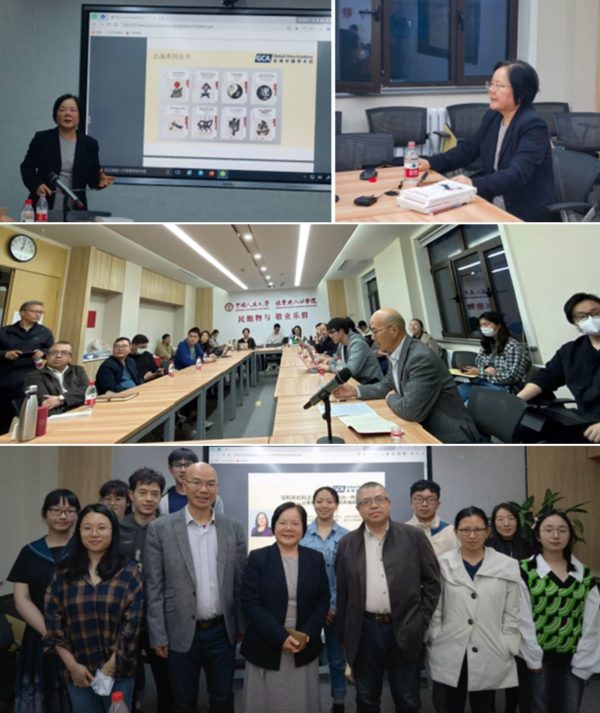
The seminar was held in the evening, titled ‘A Text Analysis Method in the Era of Big Data: Corpus-Assisted Research Based on Case Studies.’ It was chaired by Dr Huan Pingqing (first right in the middle photo), who has conducted many studies on Fei Xiaotong. He was an invited speaker at the 6th Global China Dialogue: Governance for World Peace, where he delivered the paper ‘Confucius’ Thoughts on Ethnic Relations and Its Significance to World Peace’ in 2019. He then became a Visiting Fellow at the University of Oxford in 2020, a tenure that was interrupted by COVID-19.
Professor ZHAO Xudong (to my left in the bottom photo) attended the seminar. He is the Director of the Institute of Anthropology at Renmin University and was the last PhD student under Fei Xiaotong’s supervision at Peking University. During the Q&A session, we discussed how ChatGPT could influence corpus approaches to social scientific studies. This question emerged from all my lectures and seminars conducted in China. My explanation highlighted that ChatGPT is an excellent tool for generalizing answers to general questions, providing outlines for study topics, summarizing existing work of interest, drafting letters, copy editing, and performing bidirectional translations between English and Chinese, among other tasks. It poses a challenge to all electronic data-based analysis. While it complements the corpus-assisted method, it cannot replace it. This limitation stems from ChatGPT’s inability to provide specific words in related references and their contexts. Also without reading and reserach, one cannot formulate a scientific question to effectively engage ChatGPT in conversation and further studies.
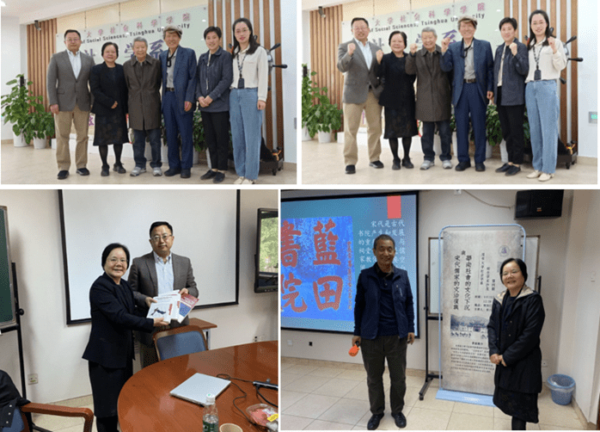
On the morning of April 20th, I, along with GCA Life Fellow HAN Sang-jin (3rd from the right in the top photos), Professor Emeritus at the Department of Sociology, Seoul National University, Korea, had a meeting at the Department of Sociology, Tsinghua University. Professor LI Qiang (3rd from the left in the top photos) joined us. He is the former Dean of the School of Social Sciences at Tsinghua University and former President of the Chinese Sociological Association. He also serves as the Chinese President of the GCA Council and is a Founding Fellow of GCA. The top two photos showcase different styles of group photos: Chinese style and Korean style, provided by Professor Han afterwards along with a note expressing a determination to collaborate among the three parties. This sentiment was echoed in his video greetings at the GCA’s founding ceremony, as presented by Professor LI Qiang (click here to watch). Dr. ZHENG Lu (1st from the left in the top photos) chaired the meeting. He is Deputy Head and Associate Professor of Department of Sociology and the ‘RONG’ Professor of Data Sciences at Tsinghua University. I presented him with some publications published by Global Century Press (left photo in the bottom row), and he expressed a willingness to collaborate with GCA. He delivered a speech entitled ‘Good Finance and Good Society: Financial Institutional Reform’ at the 7th Global China Dialogue: Reforming Global Governance in 2021. Dr. ZHAO Yizhang (1st from the right in the photos) from the Department of Sociology and Dr. CHEN Yulin (2nd from the right in the photos) also attended the meeting. The right photo in the bottom row features Professor ZHANG Xiaojun and me beside a poster of his lecture. He is the former Director of the Institute of Anthropology at Tsinghua University. We met at a national sociological conference in Guangzhou 38 years ago and have maintained a good relationship since then.
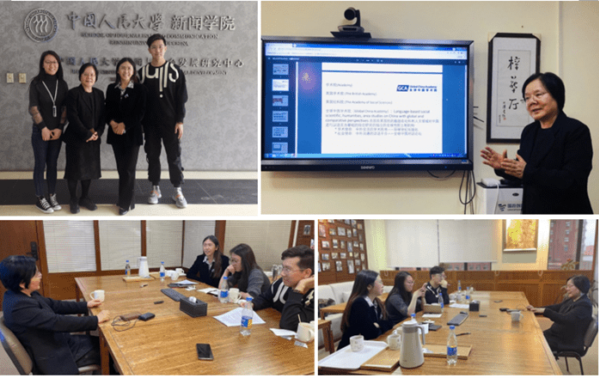
On the afternoon of April 20th, I was invited by Professor ZHONG Xin (2nd from the left in the top photo), Deputy Director of the Institute of Public Communication at the School of Journalism, Renmin University of China. As mentioned in the above section at Wuhan University, media studies in Remin Uinversity is another major discipline among the top four universities in China. After she and her PhD students gave me a guided tour of the institution, centers, and school, she held a meeting for academic exchanges. She shared with me her involvement in a national social science project, one of whose sub-projects focuses on researching the persuasive power of China’s discourse on universal human values. I presented materials related to my talks and used the books published by GCP as examples.

On the evening of April 20th, I had a dinner meeting with Professor GU Yueguo (middle in the right photo) and his wife, Professor LAN Chun. Professor Gu is a Research Professor of Linguistics and the Head of the Contemporary Linguistics Department at the Chinese Academy of Social Sciences (CASS) and former Pro-Vice-Chancellor of Beijing Foreign Studies University (BFSU), China. He is also Life Fellow of the Global China Academy (click here to watch the greeting video at the GCA’s founding ceremony) and an Executive Editors of the Journal of Corpus Approaches to Chinese Social Science (JCACSS) in both English and Chinese Editions.I met Professor Gu at an International Colloquium on New Discourses in Contemporary China at Lancaster University in September 2007. He expressed interest in my talk on ‘Lishang-wanglai: a Chinese model of social relations and relatedness’. It was my attempt to cross into the discipline of social linguistics and learn about his related work. Professor LAN Chun (left in right photo) is the former Director of the Linguistics Center at the School of English, Beijing Foreign Studies University (BFSU). She also serves as the Executive Editor of the Journal of Chinese for Social Sciences (Chinese Edition), published by Global Century Press. She arranged a hybrid GCA meeting in Beijing in November 2022.
While I was in Beijing from April 18th to 20th, I participated in a series of meaningful academic activities involving some renowned institutions in the capital of China. Firstly, I delivered a speech at the School of Humanities and Social Sciences at Beijing University of Technology, founded by Professor LU Xueyi. Following that, during my visit to the Chinese Academy of Social Sciences, I revisited the foundations of Chinese sociology and reflected on the influences of Fei Xiaotong and LU Xueyi on my work. These visits underscored the advancements in social science research methods in the digital age. My experience at Renmin University of China emphasized the importance of interdisciplinary approaches in social sciences, collaborating with the Center for Sociological Theory and Methodology to explore complex social issues. Engaging with scholars from Tsinghua University, Renmin University’s School of Journalism, Beijing Language and Culture University, and Beijing Foreign Studies University was also fruitful. In conclusion, this academic journey in Beijing highlighted the vibrancy of intellectual exchange and the deep connections between Chinese social science and the global academic community, emphasizing the evolving nature of research fields and the collaborative spirit driving our understanding of social dynamics.
By Xiangqun Chang
- Click here to view Global China Academy’s President Professor Xiangqun Chang’s Academic Activities in Xiamen, Wuhan and Tianjin, 4th-11th April 2023
- Click here to view Social Mission Activities and Reflection of GCA President Xiangqun Chang in China, April 2023
- Click here to see the GCA Centre’s facilities: Driveway, Garden, Function Rooms, Libraries, Dining Area, Bedrooms, and more.
- Click here to explore the 5 ‘walk and talk’ routes, including tea and lunch. The PDF file can be downloaded.
- Click here to reach us including details on how to visit us.
- Click here to visit the GCA news section.

